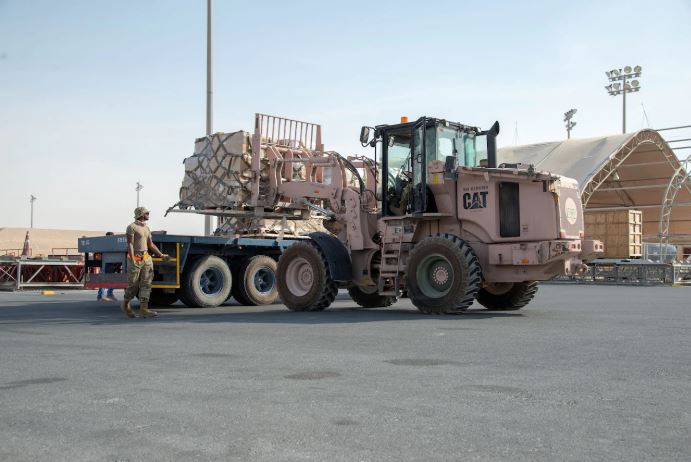The United States has sent humanitarian aid to Lebanon after the catastrophic explosion that decimated Beirut earlier last week.
“We want to express the department’s sympathies in mourning the lives of so many lost in Lebanon on Tuesday. This is a horrific tragedy,” Pentagon spokesman Jonathan Rath Hoffman said during a Washington news conference.
A U.S. Air Force C-17 carrying water, food, and medical supplies to the Mediterranean country took off from the al-Udeid airbase in Qatar for Beirut. Two further flights are inbound Hoffman said.
Eleven pallets of bottled water, as well as pallets of food and medical supplies, were on the first flight, Hoffman said.
The Pentagon, State Department, and the Agency for International Development (USAID) are working together to ease the suffering of the Lebanese people.
Volunteers, including foreign search and rescue teams, and the Lebanese Red Cross continued to search for survivors and dead bodies trapped beneath the extensive damage of the port area. But there seems to be little hope of finding any survivors now. The enormous blast was seen from miles away. It was even heard in Cyprus, 125 miles away. The explosion’s epicenter was in Beirut’s port area. The cost of the damage from the blast, aside from the human toll, is estimated to be about $15 billion. Over 300,000 people are homeless. Buildings were damaged up to 10 kilometers away.
Lebanese Prime Minister Hassan Diab said that the government is trying to track down how 2,750 tons of ammonium nitrate, a highly explosive chemical used in explosives and fertilizer, came to be stored at the port warehouse facility for six years.
Hoffman said the Defense Department will continue to work with the State Department and USAID on any additional aid missions. However, the U.S. is being careful to whom it is turning its supplies over. This means that measures are taken so that no aid goes to Hezbollah, which dominates much of the country’s political landscape and which was branded by the United States as a global terrorist organization. Hoffman made it clear that no aid was going directly to Hezbollah.
The Iranian-proxy’s militant wing has a long history of carrying out global terrorism and has declared its enmity towards Israel and the United States.
“We’re well aware of some of the concerns with [sic] whom the aid would go to, and ensuring that the aid gets to the people of Lebanon that need it most,” he added. Hoffman specified that no financial aid was being sent to Lebanon, but only humanitarian aid.
To ensure this, the U.S. military worked closely with the Lebanese Armed Forces. The aid from the U.S. will go directly into the hands of the Lebanese military, according to Captain Bill Urban, a spokesman for U.S. Central Command (CENTCOM).
Already have an account? Sign In
Two ways to continue to read this article.
Subscribe
$1.99
every 4 weeks
- Unlimited access to all articles
- Support independent journalism
- Ad-free reading experience
Subscribe Now
Recurring Monthly. Cancel Anytime.
“This will be a direct handover from the U.S. military to the LAF,” Urban said. “We are confident in LAF’s ability to receive and distribute the aid to the people of Lebanon in greatest need of support. We have received LAF assurances and are confident that they will deliver as promised.”
The port and customs office in Beirut is well-known for being one of the most corrupt institutions in Lebanon. Hezbollah controlled the area that the blast occurred.
Other countries pledging to provide aid for the people in Beirut are Egypt, the United Arab Emirates, the United Kingdom, France, Israel, and others.
The head of American forces in the Middle East, CENTCOM commander Gen. Kenneth “Frank” McKenzie, spoke with the head of Lebanon’s armed forces, Gen. Joseph Aoun.
McKenzie expressed the U.S.’s condolences and pledged continued U.S. support for Lebanon’s armed forces. The Lebanese armed forces have been placed in charge of Beirut’s security by the Lebanese parliament as part of a two-week state of emergency.
“We are closely coordinating with the Leban[ese] armed forces and expect that we will continue to provide additional assistance throughout Lebanon’s recovery effort,” McKenzie said.
At least one American citizen was killed and several more were injured in the blast, according to the U.S. Embassy in Beirut. Two family members of U.N. staffers also died in the blast and more than 100 U.N. staff members and family dependents were injured. At least 22 members of the U.N. peacekeeping force in Lebanon were also injured.










COMMENTS